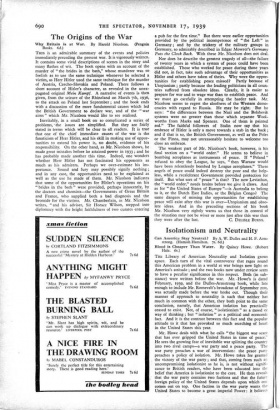The Origins of the War
Why Britain is at War. By Harold Nicolson. (Penguin Books. 6d.) THIS is an admirable summary of the events and policies immediately preceding the present war. It is vigorously written. It contains some vivid descriptions of scenes in the story and many flashes of wit. The book opens with an account of the murder of " the brides in the bath," whose murderer was so foolish as to use the same technique whenever he selected a victim, as Herr Hitler used the same technique for the murder of Austria, Czecho-Slovakia and Poland. There follows a short account of Hitler's character, as revealed in the unex- pugated original Mein Kampf. A narrative of events is then given, from the seizure of the Rhineland on March 7th, 1936, to the attack on Poland last September ; and the book ends with a discussion of the more fundamental causes which led the British Government to declare war, and of the -" war aims " which Mr. Nicolson would like to see realised.
Inevitably, in a small book on so complicated a series of problems, ' the issues are simplified. But they are fairly stated in terms which will be clear to all readers. It is true that one of the chief immediate causes of the war is the fanaticism of Herr Hitler, and his skill in making use of oppor- tunities to extend his power is, no doubt, evidence of his responsibility. On the other hand, as Mr. Nicolson shows, he made great mistakes before he attained power in 1933 ; and he has probably made another this time. Indeed, one wonders whether Herr Hitler has not fascinated his opponents as much as his admirers. Perhaps we over-estimate his im- portance. Sound and fury may possibly signify nothing ; and in any case, the opportunities need to be explained as well as the use he made of them. Mr. Nicolson indicates that some of the opportunities for Hitler's operations on his " brides in the bath " were provided, perhaps innocently, by the doctors and chemists—the Governments of Great Britain and France, who supplied both a bad diagnosis and the bromide for the victims. Mr. Chamberlain, as Mr. Nicolson writes, " and his adviser, Sir Horace Wilson, stepped into diplomacy with the bright faithfulness of two curates entering a pub for the first time." But there were earlier opportunities provided by the political incompetence of " the Left " in Germany ; and by the trickery of the military groups in Germany, so admirably described in Edgar Mowrer's Germany Puts the Clock Back. With these Mr. Nicolson does not deal.
Nor does he describe the greatest tragedy of all—the failure of twenty years in which a system of peace could have been established. Those who worked for peace during those years did not, in fact, take such advantage of their opportunities as Hitler and others have taken of theirs. Why were the oppor- tunities for establishing peace missed? Partly because of Utopianism ; partly because the leading politicians in all coun- tries suffered from obsolete ideas. Clearly, it is easier to prepare for war and to wage war than to establish peace. And we must go carefully in attempting the harder task. Mr. Nicolson seems to regret the aloofness of the Western demo- cracies with regard to Russia. He may be right. But he says : " the differences between the Nazi and the Bolshevik systems were no greater than those which separate Wool- worths from Marks and Spencer. One of them is painted red." The faithful followers of Stalin now say that his embrace of Hitler is only a move towards a stab in the back ; and if that is so, the British Government, as well as the Poles or the Finns, may not unreasonably hesitate to welcome too close an embrace.
The weakest part of Mr. Nicolson's book, however, is his final section on a "world order." He seems to believe in bombing aeroplanes as instruments of peace. If " Poland " refused to obey the League, he says, "then Warsaw would have been relentlessly bombed by League aeroplanes." These angels of peace could indeed destroy the poor and the help- less, while a recalcitrant Government provided protection for itself. But what sort of " peace " is that? The new Leviathan, the "world order," needs brains before we give it claws. And as for " the United States of Europe "—is Australia to belong to it, or the Dutch East Indies, or the Belgian Congo? The same dangers of missing the opportunities for establishing peace will exist after this war is over—Utopianism and obso- lete ideas. And in the preceding sections of his book Mr. Nicolson very rightly warns us that those in control of the situation may not be wiser or more just after this war than




































































 Previous page
Previous page